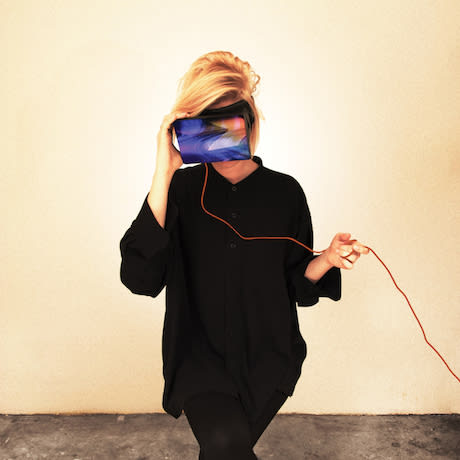Erika M. Anderson isn't comfortable and she doesn't want you to be, either. With her latest record, The Future's Void, the artist known as EMA channels her nerves about the Internet into a strong statement about the way we've lost ourselves to the information superhighway.
Contrary to the title, The Future's Void is actually an analysis of the void we live in today; a digital space in which people float around with a false sense of control.
"It left a hole so big inside me and I get terrified that I will never get it back to me," Anderson sings on the album's stripped-down centrepiece "3Jane," signifying the part of ourselves that we have now unknowingly given up to the "interwebs," a word that she effortlessly weaves into the beginning of the track without it feeling corny. "I guess it's just a modern disease."
Modern vocabulary is dispersed throughout the record, creating a timestamp on what is otherwise a timeless collection of songs. A line such as, "Making a living off of taking selfies, is that the way that you want it to be?" on the hollow industrial march of "Neuromancer" may sound odd now, in an age where the phrase is still entering everyday speech, but its core ideas will continue to echo into future discussions.
Dystopian themes aside, The Future's Void explores Anderson's wrestle with thoughts about identity, control and personal detachment, and it's in those bare-bones ageless questions that we discover the album's true gravity. There are no answers at the end of the album, but self-reflection alone is the prize here.
Through the static and fuzz comes a clarity of sorts, that truth is oftentimes going to be something both comforting and discomforting; it's why The Future's Void serves as the perfect modern day soundtrack.
(Matador Records)Contrary to the title, The Future's Void is actually an analysis of the void we live in today; a digital space in which people float around with a false sense of control.
"It left a hole so big inside me and I get terrified that I will never get it back to me," Anderson sings on the album's stripped-down centrepiece "3Jane," signifying the part of ourselves that we have now unknowingly given up to the "interwebs," a word that she effortlessly weaves into the beginning of the track without it feeling corny. "I guess it's just a modern disease."
Modern vocabulary is dispersed throughout the record, creating a timestamp on what is otherwise a timeless collection of songs. A line such as, "Making a living off of taking selfies, is that the way that you want it to be?" on the hollow industrial march of "Neuromancer" may sound odd now, in an age where the phrase is still entering everyday speech, but its core ideas will continue to echo into future discussions.
Dystopian themes aside, The Future's Void explores Anderson's wrestle with thoughts about identity, control and personal detachment, and it's in those bare-bones ageless questions that we discover the album's true gravity. There are no answers at the end of the album, but self-reflection alone is the prize here.
Through the static and fuzz comes a clarity of sorts, that truth is oftentimes going to be something both comforting and discomforting; it's why The Future's Void serves as the perfect modern day soundtrack.
